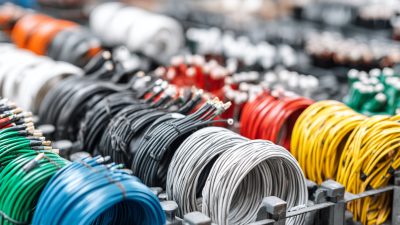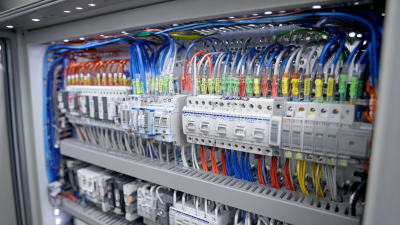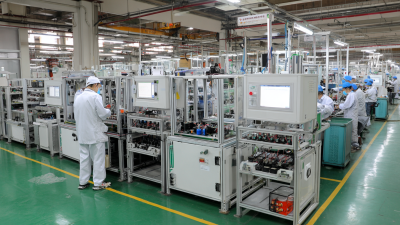The Definitive Ultimate Guide to Choosing the Best Harness Builder for Your Needs
In the rapidly evolving world of equestrian and canine gear, selecting the right harness builder can significantly impact both safety and performance. According to recent industry reports, the harness market is projected to grow by 7.5% annually, underscoring the importance of quality and suitability in harness design. With a myriad of options available, understanding the specific benefits of each type of harness is crucial for consumers. A reliable harness builder not only ensures that the harness fits well but also considers the unique needs of the animal, enhancing comfort and usability. Moreover, recent studies show that well-designed harnesses can reduce the risk of injury by up to 40%, highlighting the necessity of making informed choices in harness selection. This guide aims to navigate you through the essential elements to consider when choosing the best harness builder for your needs.

Understanding Different Types of Harnesses and Their Applications
When selecting the right harness for your needs, it's essential to understand the different types available and their specific applications. For instance, climbing harnesses are designed for safety and are often used in rock climbing, mountaineering, and other high-altitude activities. These harnesses typically feature padded leg loops and a reinforced belay loop to ensure comfort and durability during rigorous use.
On the other hand, if you’re involved in dog training or recreational walking, a front-clip harness might be the ideal choice. These harnesses allow better control over the dog’s movements and help prevent pulling during walks. Additionally, specialized harnesses for medical purposes, such as those used for patients with mobility issues, are designed to offer support and stability, often featuring extra padding and adjustable straps for a secure fit. By understanding the variations in harness design and functionality, you can make an informed decision that best suits your specific needs.
The Definitive Ultimate Guide to Choosing the Best Harness Builder for Your Needs - Understanding Different Types of Harnesses and Their Applications
| Harness Type | Material | Weight Capacity | Safety Features | Applications |
|---|---|---|---|---|
| Standard Dog Harness | Nylon | Up to 150 lbs | Reflective Straps | Daily Walking |
| Safety Harness | Polyester | Up to 250 lbs | Padded Chest, Quick Release Buckles | Outdoor Adventures |
| Reflective Running Harness | Neoprene | Up to 100 lbs | 360-degree Reflectivity | Night Running |
| Service Dog Harness | Heavy-duty Nylon | Up to 200 lbs | Customizable Patches | Service and Therapy Animals |
| X-back Dog Harness | Durable Cordura | Up to 175 lbs | Adjustable Design | Hiking, Pulling Activities |
Key Factors to Consider When Choosing a Harness Builder
When selecting a harness builder, it's essential to consider several key factors that can significantly impact your decision. First and foremost, assess the builder's experience and expertise in the industry. Look for a builder with a proven track record of producing high-quality harnesses tailored to specific needs. Their knowledge of materials, manufacturing processes, and safety standards is crucial for ensuring that the harness will perform as required in real-life applications.
Another critical factor is customization options. A good harness builder should offer a variety of designs and features to meet individual requirements. Consider whether they provide bespoke solutions that align with your functional needs, such as weight capacity, fit, and intended usage scenario. Additionally, inquire about the testing and quality assurance protocols they follow to guarantee the durability and reliability of their products. A thorough understanding of these aspects will help you choose a harness builder that not only meets your expectations but also enhances your overall safety and comfort.
The Importance of Key Factors in Choosing a Harness Builder
Evaluating the Quality and Safety Standards of Harness Builders
When selecting a harness builder, evaluating the quality and safety standards of their products is paramount. According to a report by the Occupational Safety and Health Administration (OSHA), falls remain one of the leading causes of serious workplace injuries. Consequently, harnesses must meet stringent safety guidelines to ensure user protection. A reputable harness builder should comply with standards established by industry organizations such as the American National Standards Institute (ANSI) and the International Safety Equipment Association (ISEA). These guidelines cover critical aspects including material durability, breaking strength, and design integrity.
Quality assurance processes are equally crucial. A survey conducted by the National Association of Safety Professionals (NASP) found that 70% of companies that implemented rigorous testing and quality control measures reported a significant reduction in accidents. Harness builders who undertake thorough testing phases, including impact testing and usability assessments, demonstrate their commitment to safety and reliability. Furthermore, certifications from recognized testing laboratories can provide additional assurance of a harness's performance under extreme conditions, further cementing the builder's credibility in the eyes of safety-conscious consumers.
Comparing Customization Options: Off-the-Shelf vs. Tailored Solutions
When deciding between off-the-shelf and tailored harness solutions, it's essential to consider the specific needs of your application. Off-the-shelf harnesses can be tempting due to their lower upfront cost and immediate availability. However, a report from the Wiring Harness Manufacturer's Association indicates that nearly 65% of companies have experienced integration issues with standard solutions, resulting in significant additional expenses in rework and system compatibility. These challenges highlight that while off-the-shelf products might seem more affordable, they can lead to higher long-term costs due to inefficiencies.
On the other hand, tailored solutions provide customization options that align closely with the unique requirements of your projects. According to a survey conducted by Research and Markets, approximately 70% of businesses that opted for custom harnesses reported improved performance and reliability in their systems. Tailored solutions offer the benefit of precise fit, enhanced durability, and optimized functionality, which can ultimately translate to increased operational efficiency. As companies increasingly adopt specialized applications, the demand for bespoke harness solutions continues to grow, allowing businesses to maximize their investment in technology and infrastructure.
Tips for Communicating Your Needs Effectively to Harness Builders
When selecting the right harness builder for your specific needs, clear communication is vital. A recent report by the International Association of Industrial Equipment Manufacturers (IAIEM) indicates that projects which involve comprehensive client specifications are 45% more likely to meet their deadlines and stay within budget. To avoid common pitfalls, clarity should be prioritized from the outset. Providing detailed information about your intended use, specifications, and any compliance standards can significantly streamline the development process and enhance collaboration.
Moreover, understanding industry jargon and specific terminologies can foster better dialogue between you and your harness builder. According to a study conducted by the National Electrical Contractors Association (NECA), projects marked by a mutual understanding of terms resulted in a 30% increase in satisfaction ratings from clients. Emphasizing your unique needs, deployment scenarios, and even potential challenges can lead to innovative solutions tailored specifically for you. Engaging in a transparent exchange early on promotes trust and ensures that the harness manufacturer can deliver a product that aligns with your expectations.
Related Posts
-

Ultimate Guide to Sourcing the Best Wire Harness Cables: Tips, Trends, and Market Insights for Global Buyers
-

Global Sourcing of Premium Electronic Wire Harnesses: China's Quality Leads the Way
-

The Ultimate Guide to Choosing the Right Harness Builder for Your Industry Needs
-

Finding Quality Suppliers for Best Wire Harness Manufacturing Equipment
-

Leading Global Manufacturing Facilities in Wire Harness Production Equipment
-

7 Essential Tips for Sourcing the Best Harness Cable Assembly in 2024